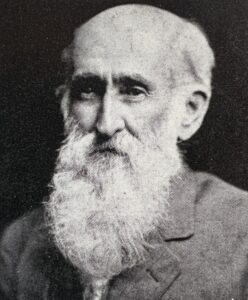The City of Potwin (Part 1)
William Joseph; the Father of the City of Potwin
By Rick McNary

Go to the northwest corner of Potwin near the cemetery at the intersection of Joseph Street and Powell some morning with a cup of coffee and turn on your imagination. Imagine the year is 1885 and you’ve come to this new town named after Charles Potwin, a land speculator from Chicago. At that time, the land you are standing on had only been a part of the United States for 24 years.
Look to the east/northeast across the pasture and imagine a wagon train slowly ambling across the prairie with men, women and children, walking along side of the oxen, guiding them up the Cherokee Trail to the promise of a better life in the West. Listen to the wagon master bark out orders as the cowboys move a herd of cattle along towards the railroad spurs further north. This was an interstate highway for wagon trains during the years of 1849 to the 1890s with upwards of 500 wagons a day coursing right through the prairie where our city now stands. If you drive down Joseph Street to the east a few yards, you can see the sign that marks the trail. Look to the north of that sign and you’ll see the swales carved in the prairie by pioneers.
If you turn back towards the west, you’ll see Diamond Creek as it courses along the prairie and shortly meets up with the Whitewater River. The confluence of those two rivers is where the first settlement in this area, known as Whitewater City, was established.
Now, turn your imagination a different direction and look north, just over the hill where the Potwin Cemetery stands. If you listen closely, you can hear hammers pummeling chisels into the limestone of a rock quarry as they shape stones that will be used for buildings in Newton and elsewhere. Soon, you’ll hear a steam engine as the spur that brings the railroad out from town picks up the stone and takes it back to the terminal. Occasionally, you’ll hear the sharp cries of the master stone mason brought over from France as he shouts instructions to the other masons.
There he comes walking up the hill, a slender man with a chiseled face covered by a beard. His sharp eyes and strong hands reveal a man on a mission. People give way to him, men nod as he draws near, he tips his hat and smiles kindly to the ladies, but he’s still moving, still going, he’s got work to do. His name is William Joseph, and he is the reason the town of Potwin exists.
Soon after the Kansas Territory became a state in 1861 and President Lincoln signed the Homestead Act in 1862, Mr. Joseph began serving as a land agent for a land speculator out of Ohio, Mr. Charles Potwin.
The expansion westward initially relied heavily on wagon trains such as those who coursed the Cherokee Trail through present day Potwin, but railroads soon became the key to settling the west. Men like Potwin were speculators who purchased land from the federal government with intent of turning a profit in reselling the land.
Mr. Joseph discovered talk of building a railroad from El Dorado to Newton and began advocating that that line went through the land that Potwin and he owned. He was successful and managed to get a station put along the line where our city now stands.
He began drawing out the lots for the original city plat and formed the Potwin Land Company. Mr. Potwin said he’d give the residents some of his land that Mr. Joseph platted, if they named the city after him. In addition, he wanted the streets named after his daughters – either their first name or their married name. Anita, Violet, Sturges, Randall, Munson and others were thus named.
And, of course, Joseph Street along the north side of our city was named in his honor.
The first Potwin Land Company was in a building where our former grocery store sat along Marshall. Now, it’s the Potwin Land and Cattle Company on North Randall, the offices of William Joseph’s descendant, attorney Alan Joseph.
As our motto says, we are proud of our past and looking forward to our future.
